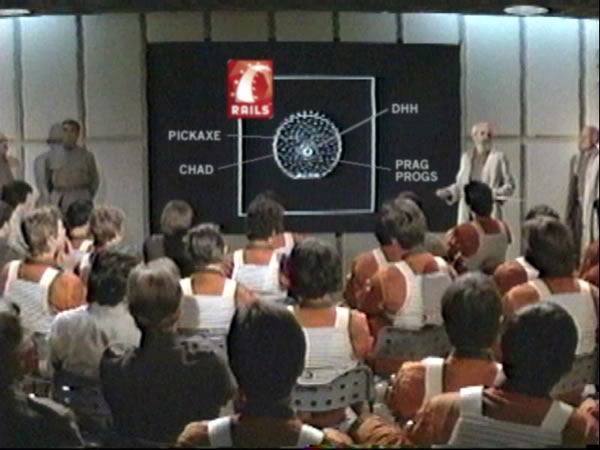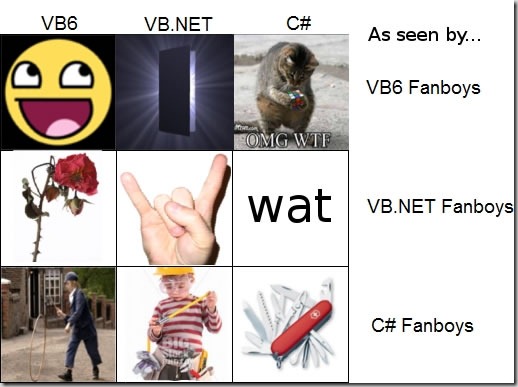It could be turning into a meme! Hot on the heels of my How Fanboys See Operating Systems post, which got a good deal of attention on Reddit and other link-sharing sites came Ruby Inside’s How Programming Language Fanboys See Each Other’s Languages, and now there’s How Microsoft Language Fanboys See Each Other’s Languages…
Tag: language wars
The guys at Ruby Inside have taken the idea of from the graphic in my How Fanboys See Operating Systems article and run with it in a post titled How Programming Language Fanboys See Each Others’ Languages:
I’m not sure what’s going in the square depicting how C fanboys see Java…
After reading Bill Burke’s article, Dynamic Languages: Rationalizations and Myths, you might also want to look at Patrick Logan’s articles, Dynamic Languages: Should the Tools Suck? and Deeper Dynamics.
Ruby is Soooooo 2002
My deadbeat ex-housemate made me aware of Ruby’s existence in 2001 when he bought the first edition of the Pickaxe book. It would take another two years before I would get my first full-on contact with Ruby thanks to Tom and Joe McDonald at vpop, who used it to develop Blogware for Tucows. Four years later, Ruby (and the framework that popularized it, Ruby on Rails) is my bread and butter at TSOT. In that time, Ruby has gone from “obscure programming language with most of its docs in Japanese” to “the new hotness” to “the whipping boy”. Reg “Raganwald” Braithwaite weighs in on Ruby’s popularity cycle in his article Ruby is Soooooo 2002.
I’ll have to write more on this later.
Manageability.org asks the question “Is Chandler’s Demise Evidence that Dynamic Languages Can’t Scale?”. For a quick reply, I’ll quote a Reddit comment: “Even if it was, such a badly-managed project wouldn’t be a good example.” Software projects have failed long before the current dynamic language hoopla — see Jeff “Coding Horror” Atwood’s article, The Long, Dismal History of Software Project Failure and the articles he cites for a backgrounder. All the projects cited in these articles most likely were developed in solid, respectable, God-fearing, non-communist static languages.
This side-by-side comparison of Java and Python shows why I prefer working in languages like Python and Ruby: the “yak shaving” that Java requires drives me crazy.

If you’ve been following the usual programmer and tech new sites, you’ve probably read (or at least heard of) Zed Shaw’s rant, titled Rails is a Ghetto. If you haven’t read it yet, go there now, give it a quick read and come back. I can wait.
High-spirited stuff, isn’t it? As you might expect, there have been a number of interesting responses to Zed’s polemic, but only one made me laugh out loud — it’s this entry in Jesse Stay’s blog:
Ruby on Rails is weak right now, it’s breaking apart from the inside. Now is the time for the Perl community to show its strength and unite in an effort to make Perl once again the most used platform on the web!
Perhaps it’s time for Larry Wall to update his maxim about the great virtues of a programmer: it should now be laziness, impatience, hubris and revenge fantasies.

